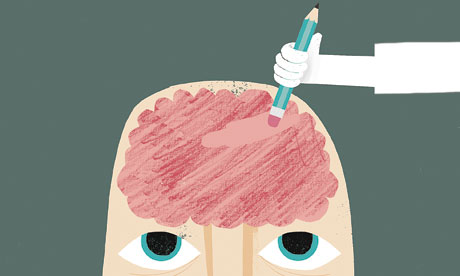Thanks
to brain training companies, it seems everyone is trying to increase his or her
memory. It’s easy to argue that better memory can only positively impact your
life, but in fact forgetting serves an equally important role in cognition.
Specifically, forgetting is necessary for two reasons- forgetting (especially
of details) allows for automatized skills and semantic encoding and forgetting
is emotionally adaptive to neglect some painful or negative memories.
 First
let us examine the case of AJ, a woman with highly superior autobiographic
memory. If you were to ask AJ what happened 20 years ago on April 11, she could
list exactly what she wore that day, along with all of her activities. Her
memory is able to retain an episodic account of nearly every day of her life.
However, this ability deeply intrudes on her life. She reports, “Most have
called it a gift but I call it a burden. I run my entire life through my head
every day and it drives me crazy” (Parker et al., 2006, p. 35). Imagine every
time you went to the grocery store, you remembered every other instance of a
trip to buy milk. It would be cognitively taxing and unnecessary to sustain all
these individual memories. And in fact, a study by Logan and Crump (2009)
demonstrated the necessity of losing detailed memory in professional typists,
who aren’t able to verbalize where keys are located or how their hands are
moving. Yet these workers are still extremely proficient in their job, and when
they are asked to explicitly focus on what their hands are doing, their
performance suffers. These typists do not have detailed memory of every time
they sat down at a keyboard, but their skill demonstrates that a composite of
all those experiences meshed together have given them their proficiency. Thus,
forgetting may allow for details of episodes to be removed so that abstraction
and generalized skill learning can occur.
First
let us examine the case of AJ, a woman with highly superior autobiographic
memory. If you were to ask AJ what happened 20 years ago on April 11, she could
list exactly what she wore that day, along with all of her activities. Her
memory is able to retain an episodic account of nearly every day of her life.
However, this ability deeply intrudes on her life. She reports, “Most have
called it a gift but I call it a burden. I run my entire life through my head
every day and it drives me crazy” (Parker et al., 2006, p. 35). Imagine every
time you went to the grocery store, you remembered every other instance of a
trip to buy milk. It would be cognitively taxing and unnecessary to sustain all
these individual memories. And in fact, a study by Logan and Crump (2009)
demonstrated the necessity of losing detailed memory in professional typists,
who aren’t able to verbalize where keys are located or how their hands are
moving. Yet these workers are still extremely proficient in their job, and when
they are asked to explicitly focus on what their hands are doing, their
performance suffers. These typists do not have detailed memory of every time
they sat down at a keyboard, but their skill demonstrates that a composite of
all those experiences meshed together have given them their proficiency. Thus,
forgetting may allow for details of episodes to be removed so that abstraction
and generalized skill learning can occur.
As
mentioned before, forgetting not only benefits cognition, but also assists in
emotional stability. Joorman and colleagues (2009), among many others, have
demonstrated that depression is linked to an inability to forget negative
memories. Perhaps if we were able to remember every embarrassing moment and
social faux pas, we would be less likely to take social risks or even engage with
others at all. Forgetting negative experiences can help us stay open to new
social experiences or maintain important relationships. Going back to the case
of AJ, she was diagnosed with both depression and anxiety, maybe because she
couldn’t forget her negative experiences. Thus, AJ exemplifies that there is no
evolutionary benefit to remembering every negative experience.
Memory
is unequivocally important for many functions, but forgetting also serves a
purpose in maintaining healthy functioning. Without forgetting, we might be
less positive about the future and unwilling to take the big risks that advance
science and other fields. We would also be unable to garner abstract
information from multiple situations or sources we encounter. Like tow sides of
the same coin, forgetting and remembering balance each other.
Works Cited
Joormann, J., Hertel, P. T., LeMoult, J., &
Gotlib, I. H. (2009). Training forgetting of negative material in depression. Journal
of abnormal psychology, 118(1), 34.
Logan, G. D., & Crump, M. J. (2009). The
Left Hand Doesn't Know What the Right Hand Is Doing The Disruptive Effects of
Attention to the Hands in Skilled Typewriting. Psychological Science, 20(10),
1296-1300.
Nørby, S. (2015). Why Forget? On the Adaptive Value of Memory Loss.Perspectives on Psychological Science, 10(5), 551-578.
Parker, E. S., Cahill, L., & McGaugh, J. L.
(2006). A case of unusual autobiographical
remembering. Neurocase, 12(1),
35-49.
No comments:
Post a Comment